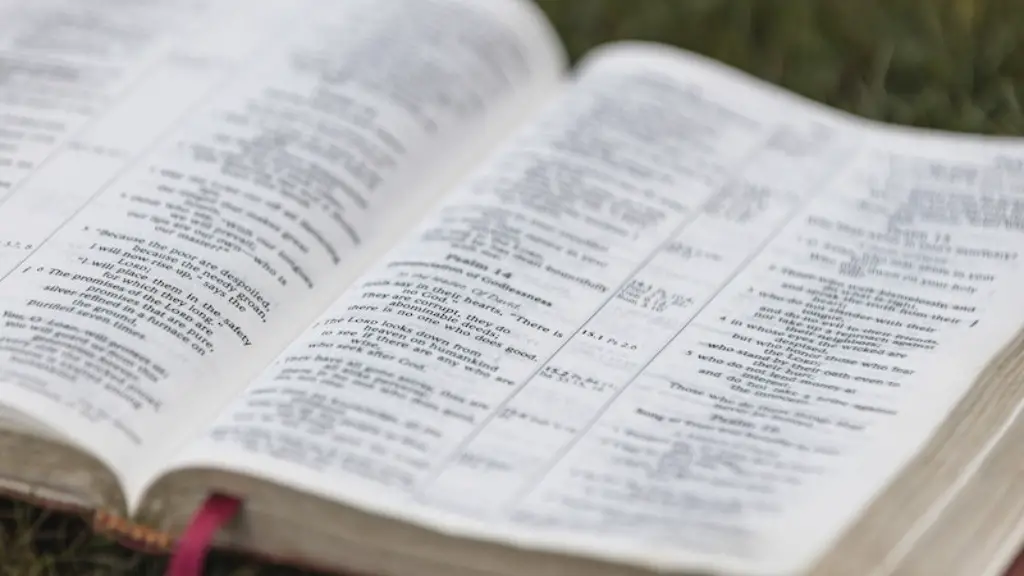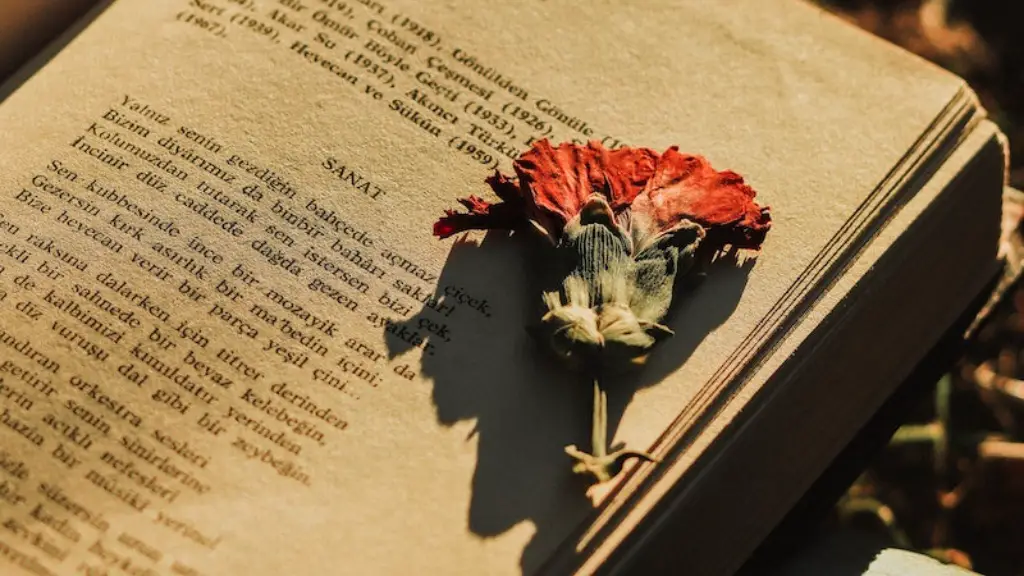Walt Whitman is one of America’s most beloved poets and is considered to be one of the founders of free verse. His works have influenced generations of artists and writers and inspired so many, both young and old, to express their creativity. Indeed, Whitman’s contribution to poetry is immense, and many consider him to be one of the most important literary figures in history. His open-ended style and creative experimentation with language and form have left a lasting legacy on the field of poetry.
One of Whitman’s most significant contributions to literature was his radical use of ‘free verse’. He rejected traditional rhyming metered structure, which he labelled as ‘artificial’. He sought to create a new kind of poetry, one which was liberated from the stranglehold of restrictive poetic forms. His free form approach made poetry more accessible, providing a platform which enabled readers to perceive the power of experience and embrace life in all its complexity.
His democratic approach to literature was revolutionary; it championed the notion that all men and women are equal. This timeless message of unity and inclusion resonates with readers to this day and remains a cornerstone of American literature. His works often reflect an element of optimism, a rejection of traditional social order and an embracing of diversity.
Whitman was not only a poet, but also a great humanist. He cared deeply about social issues and championed the rights of workers, immigrants and blacks. His works often address political and social issues, and his powerful words served to raise awareness about the injustices of the world. Many consider him to be a moral compass and an example of how literature can be used to marshal real change in society.
Perhaps most importantly, Whitman’s imaginative and creative proverbs encouraged readers to question conventional wisdom and encouraged them to explore the unknown. His works provided an emotional connection between the reader and the poet, and gave readers an emotional outlet for their innermost thoughts and feelings. His poetic lines often evoke a sense of love and compassion and remind readers of the importance of connecting with others.
Whitman’s works are widely studied, discussed and celebrated to this day. He was a master of free verse and a pioneer of modern poetry. His radical work and democratic ideals have been a source of inspiration to generations of writers and readers. His contributions to poetry will undoubtedly remain timeless and iconic, and he is sure to remain one of the most important figures of American literature.
Form & Language
Whitman’s famous style of ‘free verse’ was unique for its time. He sought a more informal and ‘open format’ to give his words more freedom. He wanted an immediacy and wave-like rhythm of speech, something that would move beyond traditional verse forms. The sensuous rhythm and repetition of language, which he developed in his poetry, depart from traditional rhyme schemes and strict meters. He innovated by giving vocal expression to the free flow of thought, as is evident in his works. He also created powerful, musical poems by infusing language with musicality and emotive, evocative imagery.
Whitman’s unique langue and crafty style enabled him to create an intimate connection between the reader and the poet, making a lasting impression on the reader. He employed the use of metaphor and personification to explore the depths of human experience, enabling readers to really feel the emotion, power and meaning of his words. His works remain as important today as they were during the transcendentalist period of the 1800s.
The combination of his poetic technique and diction which evokes imagery and emotion allow readers to contemplate the beauty of language, as well as the depth of Whitman’s sensitivity and creativity. By utilizing precise imagery and intense sentiment, Whitman created an atmosphere and energy which linger in the mind long after reading his works.
Poetic Devices
Whitman made full use of various poetic devices in his works such as similes, metaphors, personifications and allusions. He cleverly employed them to explore his themes in an efficient, expressive and powerful manner. His use of imagery to convey his emotions adds a layer of richness and profundity to his works. He also innovated by including various unexpected elements such as humor, irony and satire into his work, making them enjoyable to many different audiences.
Similes and metaphors are a common feature in his works. He used them to evaluate and draw comparisons between two ideas and to highlight certain features by creating a vivid image. Whitman often employed vivid personifications to make the mundane appear extraordinary and to bring the abstract into a tangible form.
By creating allusions, which are references to other works of literature, Whitman was able to provide a connection between his work and the classics. His skillful use of allusions enabled him to comment on and reflect upon his themes in a creative and meaningful manner.
Whitman’s approach to poetic devices was highly innovative and unlike anything that had been done before. His works abound with vivid imagery and powerful language, and he managed to create fascinating landscapes and make everyday themes come alive. He used poetic devices to explore the complexity of human experience and evoke emotion in his works.
Influence
Whitman’s works have had profound influence in subsequent generations of writers and readers. Generations of American writers have used Whitman’s open form and musical language to create their own style of free verse. His enterprising approach to issues such as social injustice and his stance on democracy introduced a new kind of poetry which brought to surface the many problems of America. Many writers were influenced and inspired by Whitman, including James Joyce, Ernest Hemingway, Ezra Pound, T.S. Eliot and Robert Frost.
The influence of Whitman’s works can be seen clearly in modern poetry. His works have had a huge influence on a dynamic range of poets, from Walt Whitman’s former contemporaries in the 18th century to today’s postmodern poets. His works provide an insight into the creative process, enabling poets to explore new ideas and find inspiration in their own work.
Whitman is commonly referred to as the ‘father of free verse’, and his works remain just as relevant and inspiring today as they did in the 19th century. His contribution to literature is immeasurable; his works reflect the vastness of human experience, enriching our lives and providing a source of profound insight into the complexity of life and death.
Legacy
The legacy of Whitman’s life and works is far-reaching. He captured the spirit of a nation, creating a lasting corpus of works filled with hope, love and optimism. His unabashed and honest approach to literature challenged the conventions of his time, empowering readers to confront the realities of life and explore the unknown. His works evoke a sense of awe and admiration, encouraging readers to never give up and embrace the beauty of life.
Whitman continues to be studied and celebrated in classrooms, seminars and conferences around the world. His words remain eternal, profoundly resonating with readers to this day. His unique voice and profound understanding of the complexities of life, love and death have left a huge impression on the literary world. His works have the power to move us, to inspire us, to open up a whole new world of possibilities.
Whitman’s greatest legacy to poetry is the liberation of language, the embracing of free form and the creation of an atmosphere and energy which linger in the mind long after reading his works. His use of poetic devices and creative proverbs encouraged readers to question conventional wisdom and open their minds to new ways of thinking. His works are sublime, inspiring and entirely unique.
Conclusion
Walt Whitman’s incredible contribution to literature and romance cannot be overstated. His innovative use of free verse and profound understanding of the human condition served to revolutionize the field of poetry. His works urged readers to explore their own creativity and to embrace life with an optimistic outlook. His profound works and democratic ideals have been an inspiration to generations of writers and poets and his legacy will continue to reverberate through poetry for many years to come.





